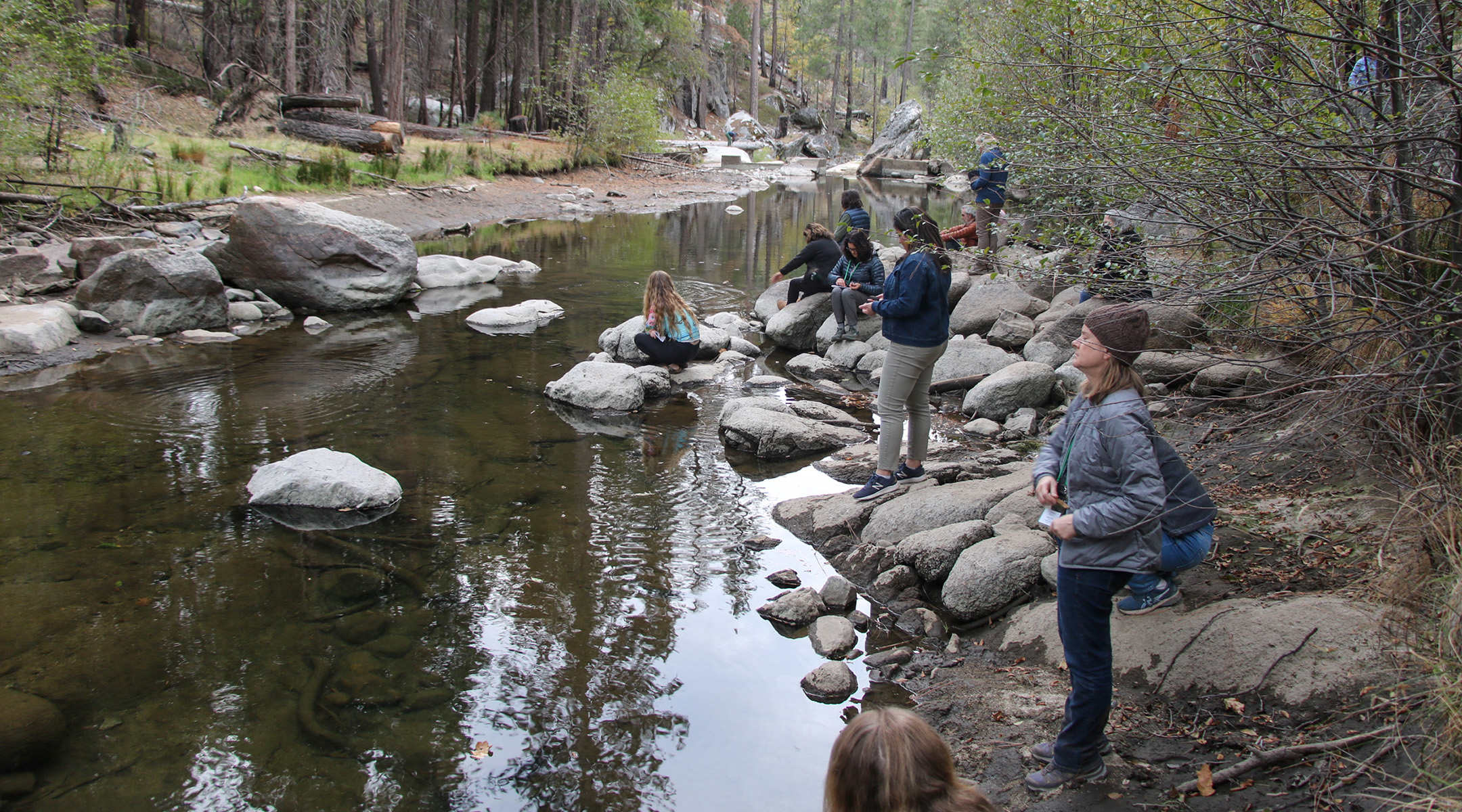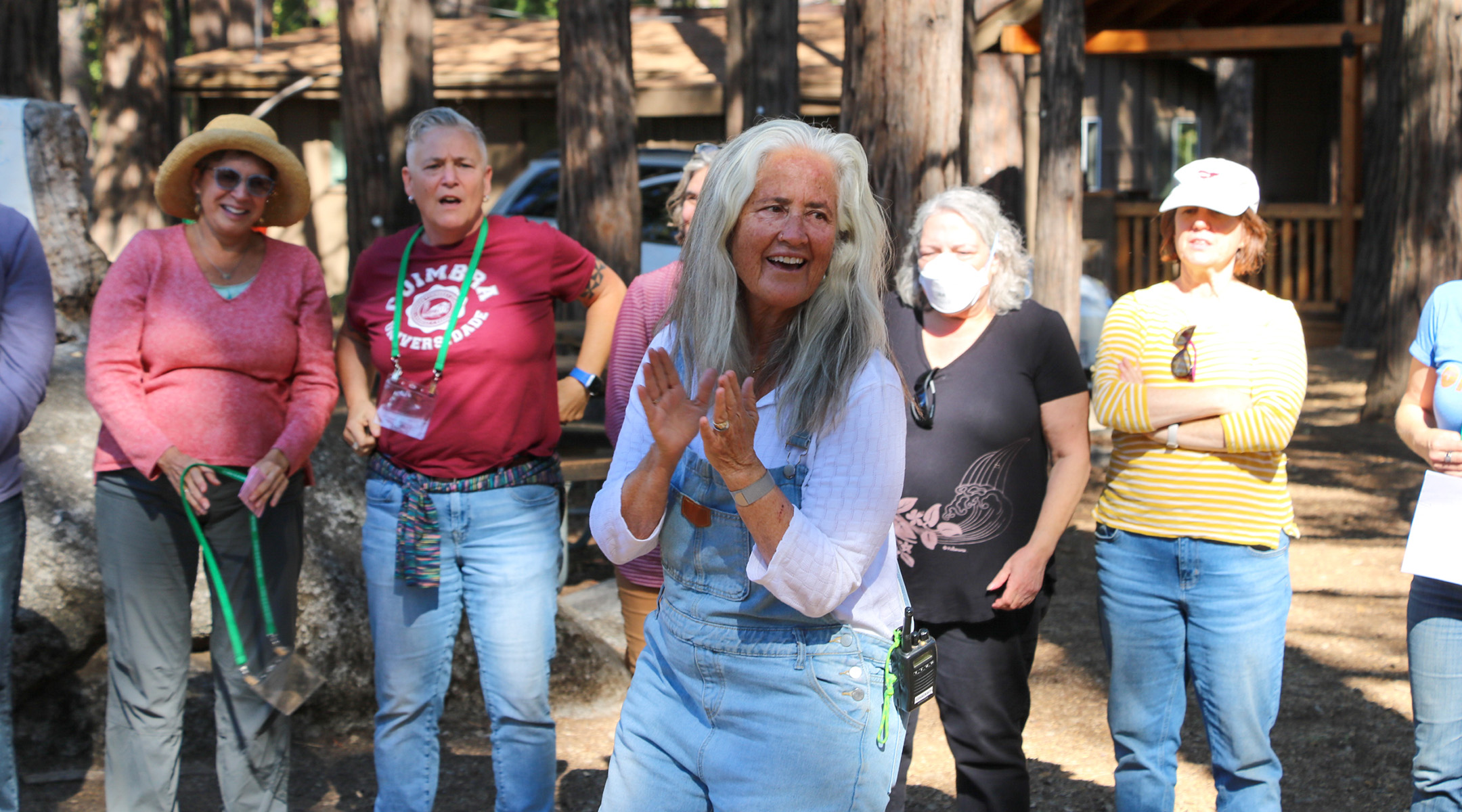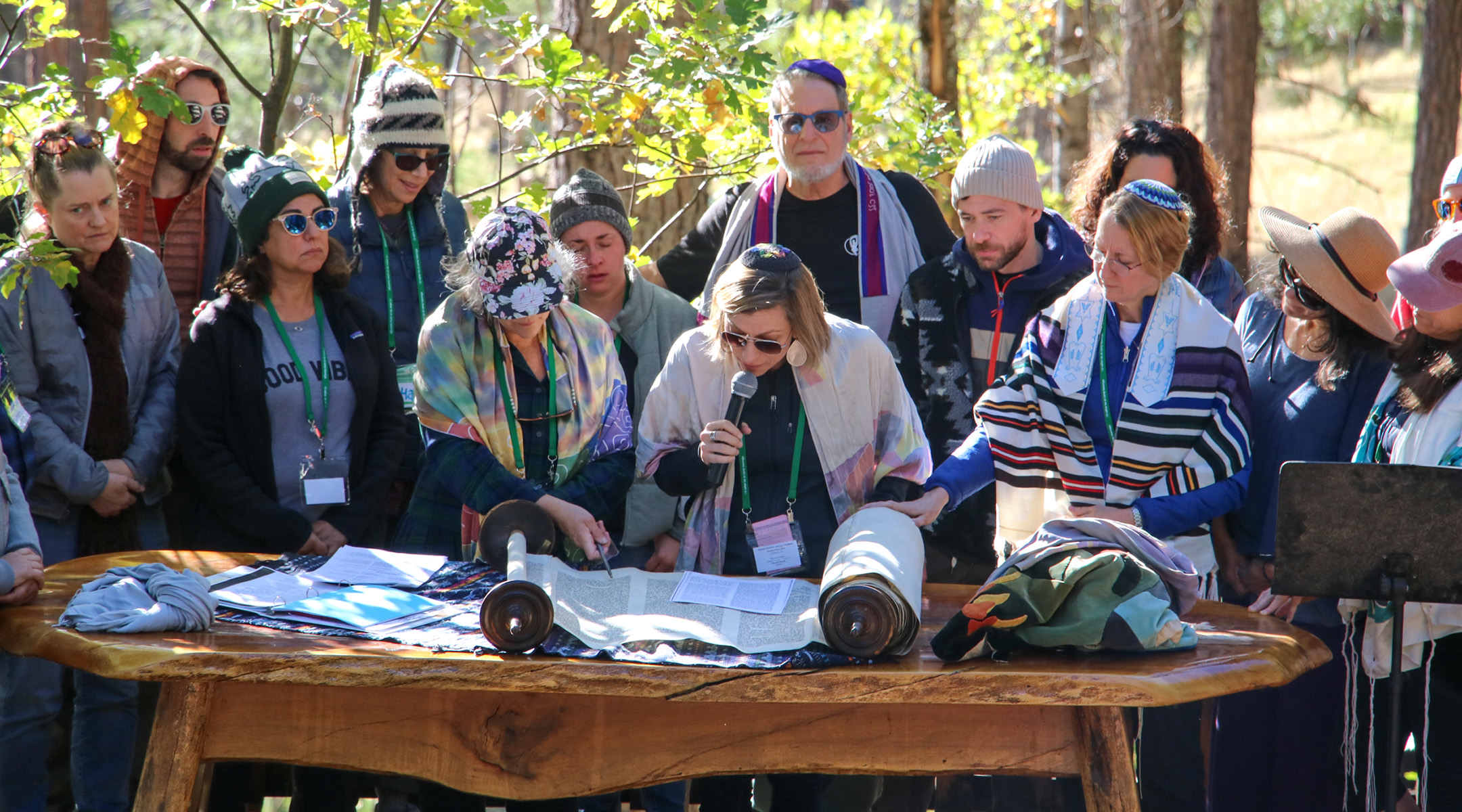Jewish marriage rites are robust. Now a rabbi is innovating rituals for Jews who divorce.
‘One person ‘tashliched’ their wedding ring into the river,’ Rabbi Deborah Newbrun recalled about the first ‘Divorce & Discovery: A Jewish Healing Retreat.’

Divorce and Discovery tashlich ritual, in which attendees cast off unwanted feelings they were carrying around from their divorce. (Photo/Margot Yecies)
(J. The Jewish News of Northern California via JTA) — For Lyssa Jaye, throwing the wood chips into the Tuolumne River felt in many ways familiar to the tashlich ritual performed on Rosh Hashanah. But rather than casting off her sins, she was tossing away feelings: shame, resentment, anger.
They were the emotions that had taken residence inside Jaye since her divorce eight years ago, along with a sense of failure. And she had come to a Jewish retreat to rid herself of them.
“I’ve been carrying around these feelings for years now,” Jaye said. “I have a completely different life now, and I needed to let them go.”
Jaye was taking part in Divorce & Discovery: A Jewish Healing Retreat, the first-ever gathering in a series conceived by Rabbi Deborah Newbrun as part of her training, held this month at Camp Tawonga in the Bay Area.
One of the requirements at the Pluralistic Rabbinical Seminary, where Newbrun was ordained last year in the first graduating class, “was that each of us had to do an innovation, or something that didn’t exist before,” she said.
Newbrun, who directed Camp Tawonga for more than two decades, has been recognized for innovative programming for such achievements as initiating Tawonga’s LGBT family camp and founding its wilderness department. She even won a prestigious 2018 Covenant Award for Jewish educators. But as she started thinking about how to fulfill the seminary requirement, her first thought was, “I don’t have any ideas left in me.”
Then she began reflecting back on her divorce years earlier. She remembered how she had approached numerous rabbis and colleagues in search of Jewish support around the grief she felt. And how they all came up empty-handed.
That’s when she realized: “I can put together something meaningful and helpful for people going through divorce.”
From the moment participants arrived at Camp Tawonga near Yosemite, they knew this would be no ordinary Jewish retreat. At the opening event, all of the facilitators, several clergy members and a therapist shared their own divorce stories, “to set the standard and normalize vulnerability, transparent sharing and establish that we all know what it’s like to have a marriage end,” Newbrun said.
Most participants were from the Bay Area, with a handful from farther afield. They were in different life stages, from those in their 30s dealing with custody battles over young children, to empty nesters in their 60s. Some had separated from their partners years ago, while others had gone their separate ways more recently. Some split amicably; a good many did not. But all had come up against a lack of Jewish resources or support when navigating this major life passage.

Rabbi Deborah Newbrun, the founder of Divorce and Discovery at the recent weekend. (Photo/Margot Yecies)
Jaye said she left no stone unturned in seeking out support, an experience Newbrun said she heard echoed by many participants. Jaye attended a retreat at a local meditation center. She read self-help books. She joined a support group for divorcees. She went to therapy.
And while they all helped in different ways, none was specifically Jewish.
“I knew I needed some kind of spiritual way forward,” she said. “I needed to do this in my own language, with my own people.”
Even though the retreat came nearly a decade years after Jaye’s divorce, “it was profound. It felt like coming home, and that this is what I needed all along. This model could be extremely powerful. The rituals we did could be taught in rabbinical schools or to Jewish educators so it’s not just ‘sign this get and goodbye,’” she said, referring to the Jewish divorce document.
Rather than create new rituals, Newbrun and her facilitators took familiar Jewish rituals and retooled them.
The tashlich ritual, led by Newbrun and Maggid Jhos Singer, had a call-and-response portion, and participants also could call out what they personally wanted to cast off. “One person ‘tashliched’ their wedding ring into the river and felt it was such a perfect place to let it go!” said Newbrun.
An optional immersion in the Tuolumne River followed. Jaye, who years ago went to the mikvah alone, with only the attendant there for support, said there was no comparison with how much more healing it felt performing the ritual in community.
A session on sitting shiva for one’s marriage, led by Rabbi Sue Reinhold, allowed participants to share and mourn the loss of what they missed most about being married. That resonated for Robyn Lieberman, who does not attend synagogue services but went to every session at the retreat on innovating Jewish rituals.
“I did need to mourn what I’m losing,” said Lieberman, who had been married to an Israeli. “We had a very public, open house around Jewish religion, and a constant Israeli identity, which fulfilled my Jewish needs.”
Rabbi Jennie Chabon of Congregation B’nai Tikvah in Walnut Creek reflected on how much time she has spent with couples preparing for their wedding day, both in premarital counseling and in planning the event, and on how many marriage-related topics are covered in rabbinical school.
“And when it comes to divorce? Nothing,” Chabon said. “We’re all out here on our own trying to figure out how to wander through it.”
She was tasked with creating a havdalah ceremony with a divorce theme, in which she reimagined the wine, spices and flame typically used to mark a division between Shabbat and the rest of the week.
“There’s a fire that burns within each of us, and that flame doesn’t go out,” said Chabon, 47. “When you’re married for a long time, your identity, energy and spirit is so woven into that of another.” Her ritual was meant to affirm that “you are on fire just as you are, and you’re a blessing as an individual in the world. You don’t need a partnership or family to be whole.”
Even the Shabbat Torah service was on theme.

Rabbi Jennie Chabon reads from the Torah during a service at the Divorce and Discovery retreat. (Photo/Margot Yecies)
Rather than focusing on Noah’s emergence from the ark after the flood, Chabon spoke about a lesser-known section of the week’s Torah portion, in which Noah builds a fire and offers a sacrifice to God. But if the entire earth was drenched from the flood, Chabon asked, what did he burn?
“The answer is he must have burned the ark,” Chabon said in recalling her talk at the retreat. “What does that mean for people going through this incredibly painful and tender time in their lives, when what was once a safe container and secure and protected them, they have to burn it down in order to start life anew?
“This is a perfect rebirth metaphor. But what’s being birthed is a new self and a new identity in the world as a single person,” Chabon said. “You have to release and let go of what was to make room for the blessing for who you’re going to become.”
At a ritual “hackathon” workshop presented by Newbrun, participants suggested standing during Kaddish at synagogue to mourn their marriages, and offering their children a Friday night blessing that they are whole whether they are at either parent’s home.
Not all of the sessions centered on Jewish ritual. In a session on the Japanese art of kintsugi, or mending broken pottery, attendees made vessels whose cracks they fixed with putty, symbolizing that beauty can be found in imperfection. Many danced in a Saturday-night silent disco.
Everyone was assigned to a small group, or havurah, that they met with daily, so they could establish deeper connections within the larger cohort.
“To have gone through some of these practices was very meaningful to me,” said Lieberman. “It’s not like I put a seal on my marriage and wrapped it up in a bow and put it behind me, but it was a nice catharsis for completing a transition that I’ve been very thoughtful about.”
Newbrun aims to recreate the retreat in communities around the country. Both Jaye and Lieberman said they found value in being in community with people “who get it,” without the judgment they often face.
“I was a little skeptical that all I’d have in common with people was that we were Jewish and divorced, and that that wouldn’t be enough for me to form a relationship,” said Lieberman. “But having the willingness to talk about it and explore it did open up a lot of very vulnerable conversations. The expert facilitation really made us think about the fact that divorce is not about your paper [certificate], it’s about reexamining the direction of your life and who you want to be.”
A version of this piece originally ran in J. The Jewish News of Northern California, and is reprinted with permission.
This article originally appeared on JTA.org.















